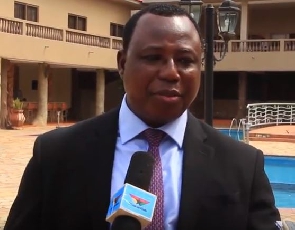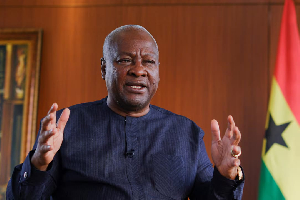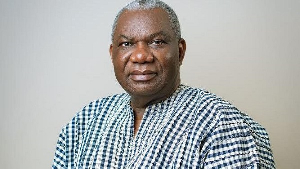The Commissioner of Human Rights and Administrative Justice of Ghana, Joseph Whittal, has said it is not enough for citizens to vote for political parties based on their manifestos, but they must go a step further to monitor the fulfilment of the manifesto promises.
Mr Whittal wants Ghanaians to actively hold politicians to account regarding the manifesto promises they make in the run-up to elections.
“Let’s be a militant citizen. Somebody says we should not be spectators, but citizens. I will say let’s not just be citizens but active citizens. We [should] give what we want to government and expect that it delivers it for us,” the CHRAJ Commissioner admonished.
President Nana Addo Dankwa Akufo-Addo said during his inaugural speech as Ghana’s 5th President in January 2017 that “I ask you to be citizens: citizens, not spectators; citizens, not subjects; responsible citizens building your communities and our nation. Let us work until the work is done."
The President made the comments to rally Ghanaians to take part in the governance of the country.
However, amending that famous saying, Mr Whittal said it has become necessary for citizens to follow important national issues, like corruption, and ensure that political parties who fail to implement manifesto promises are punished.
Mr Whittal was speaking at the launch of the Citizens’ Anti-Corruption Manifesto on Wednesday, August 26, 2020, at the Coconut Grove Regency Hotel in Accra.
The citizens’ manifesto is a project that seeks to inform strategic policy direction for the political parties before they are elected into office.
The project is funded by STAR-Ghana Foundation with support from UKAid and European Union.
It is titled, “Making All Voices Count in the 2020 Anti-Corruption Agenda of Political Parties’ Manifestoes” and reveals, among other things that, citizens want legislative reforms to prioritise stronger sanctions against proceeds against criminal activity.
On the administrative fronts, citizens proposed that there should be an introduction of anti-corruption and integrity curricula in schools.
During a Q&A session at the launch event, a participant asked how political parties can be made to stick to the anti-corruption campaign promises they make since they have failed in the past to implement other manifesto policies.
Responding to the question, Mr Whittal said citizens are central to ensuring that the political class deliver on their mandates when they are elected.
“If citizens want it to work, it will work. It is about our ability. We have been socialised into thinking that once you give your vote, that is the end. Political parties that do not carry out what we want…if you give them the [anti-corruption] manifesto, which is not self-seeking…if they don’t do it…we vote you out,” he said.
The citizens’ manifesto is spearheaded by the Ghana Integrity Initiative and the Ghana Anti-Corruption Coalition as part of efforts to improve Ghana’s worsening anti-graft profile.
Ghana’s performance on the Corruption Perception Index (CPI) is ranked among the poorest in recent times.
Ghana’s CPI score has been dropping since it achieved its highest score of 48/100 in 2014. The score dropped to 47/100 in 2015 and even further to 43/100 in 2016. The score for 2017 was 40/100 and in 2018 it increased by one per cent to 41/100. In the latest CPI (2019), Ghana’s score remained the same – 41/100.
Click to view details



General News of Wednesday, 26 August 2020
Source: www.ghanaweb.com
Don't just be citizens be 'militant citizens' - CHRAJ boss
Entertainment
















